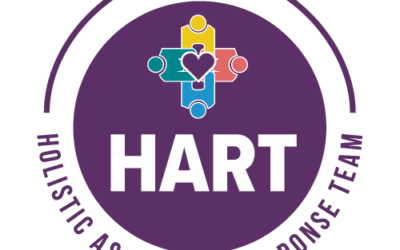Artificial intelligence, or AI, is changing how we live, work, and even how we take care of our mental health. At the Hogg Foundation, we care deeply about how new tools like AI are being used to help people. In Episode 174 of Into the Fold, we talk with Dr. Kenneth Fleischmann, professor at the University of Texas at Austin School of Information, about the ethical, practical, and deeply human dimensions of AI’s growing role in mental health.
AI Is Already Everywhere
While we often think of AI in relation to humanoid robots or futuristic machines, Kenneth emphasizes that most AI today functions behind the scenes.
“There are so many ways that we’re using AI and not even stopping to think about the fact that we’re relying on it,” says Kenneth.
For example, when our phones give us directions, or when a streaming app suggests music or movies—that’s AI at work. And now, people are starting to use tools like ChatGPT for help with homework, writing, and even mental health support. That development, says Kenneth, raises important questions about how and when we deploy these tools.
AI and Mental Health: Moving Fast, But at What Cost?
One major challenge is the rapid pace of technological innovation. Unlike medicine, which is tested for years before it’s used, tech companies often release AI tools without fully knowing how they might affect people.
“With information technology,” says Kenneth, “the ethos has been to put it out there, see what happens and deal with the consequences later.”
That approach can be risky—especially when it comes to mental health.
Social media gives us a good example. Algorithms are used to keep us online longer. But studies show this can lead to “doomscrolling”, cyberbullying, and even increased anxiety and depression, especially for teens.
Can AI Help Mental Health?
AI may be helpful in some areas of mental health care, but there are limits. While some apps or chatbots can offer support, they are not the same as talking to a real therapist.
Still, AI might be useful with a therapist.
“I’m much more comfortable with AI being used by professionals, not instead of them,” Kenneth says.
For example, a therapist might use AI to keep notes, organize information, or manage their schedule—helping them spend more time with their clients.
What About Fairness?
One of the biggest worries about AI and mental health is the need for fairness. What if only wealthy people get to see real therapists, while everyone else only gets AI?
But stopping people from using AI isn’t the answer either.
“The only thing worse,” says Kenneth, “would be having no help at all.”
The potential of AI, he says, lies in giving mental health professionals better tools—ones that can help them serve more people, not sideline them.
“To me, that should be the goal of all health care, including mental health care: universal access.”
Don’t Believe All the Hype
New technology often gets overhyped. Kenneth reminds us that this isn’t the first time people have gotten excited about AI.
“Yes, it plays chess well, it plays Jeopardy well,” says Kenneth. “But then you try to get it to fix our health care system… and it’s a lot more complicated.”
AI is not going away. And it will continue to shape how we care for mental health. That’s why we must keep asking hard questions: Who is being helped? Who is being left out? Are we using these tools in ways that are safe and fair?
As Kenneth says, “There are so many perils… but also many possibilities.”
Related Links
- Ethical AI
- Good Systems
- University of Texas at Austin Undergraduate Informatics Program
- University of Texas at Austin Master of Science in A.I.
Root-Bound or Growth Mindset?
A growth mindset is the belief that skills and abilities can be improved and that developing these is the purpose of your actions.
Listening to Learn: Lessons from Communities of Care
As we move forward, the foundation will continue to show up in communities with the spirit of collaboration and listening to learn.
Special Opportunity Funding: Emotional Well-Being on the College Campus
Two of this year’s Special Opportunity Funding grants were awarded to programs that support student wellness at the university level.
Bridging the Gap: Insights on Mental Health Care from Australia and the U.S.
In June of 2024, several Hogg Foundation staff members, including Tammy Heinz, senior program officer and consumer and family liaison, attended the Global Leadership Exchange (GLE) in the Netherlands. The international gathering connected leaders in mental health,...
Toward a More Effective 911 Alternative
This blog post is guest authored by Larry D. Brown Jr., PhD, associate director for Community Health and Violence Prevention Services at Harris County Public Health. He presented a session at the Robert Lee Sutherland Seminar as part of the Building Partnerships and Collaboration track.
Your Nonprofit is Probably Overcomplicating Its Data Collection
Three common reasons why nonprofits struggle with data collection and how to overcome them.






